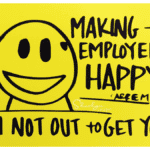I came across an article from Harvard Business Review titled “Why People Really Quit Their Jobs”. It’s an interesting read worth checking out. It reminded me of a Glassdoor survey I saw recently that said voluntary quits are at an all-time high.
We’ve been talking about the shift to a candidate-driven market for quite some time. That’s not a surprise. What does surprise me are the reasons employees are leaving. On one hand, we have organizations reciting the old mantra “People don’t leave jobs; they leave bad managers.” And then, I read this Society for Human Resource Management (SHRM) article that says the majority of people leave for money.
I don’t have to tell you that those aren’t the same thing. So, which one is it? We haven’t done a poll in a while. I thought this might be a good question to ask.
Organizations say that engaging and retaining employees is a top priority. If that’s true, then understanding the reasons that employees may start looking is key.
Image captured by Sharlyn Lauby while exploring the streets of Key West, FL
16








Don Johnson says
My vote was for other and here’s why. If I told I’m looking for more opportunity to make a bigger difference in an organization would you understand? With so many organizations doing such a better job at engaging their workforce they are now looking for more fulfillment. A little engagement leads to desire for more. Pay has dropped since the recession and is slowly coming back closer to where it was but the rest of the world is catching up in the meantime. The U.S. was in a pay bubble, much like the Real estate bubble, compared to other countries. That’s my point of view;)
Harold Ingmire says
It is common for people to leave due to poor managers (have done that a couple of times), but recently more due to pay and/or benefits costs.
There has developed a perception in the workforce that I believe give unrealistic expectations on new jobs and their new supervisors, forgetting that work is work (and hard) and the new supervisor and co-workers are at work, and the social side of life is better kept separate from work. Work is usually a lot harder than gaining the education and lower skill sets that you gain to climb the ladder. I see people of all generations get their enjoyment from the success of the their hard work.
Much of the “soft side of work” we earn through our efforts at being competent, good team members and earning the respect most of us want from our peers and supervisors. Why do you think people leave companies that are fun, warm and fuzzy? While very nice, I do not think it matches the benefit of “earned respect”.
Anonymous says
I had to vote “other” because two of the responses were equally weighted. Being able to select multiple answers (up to 2 or 3) would have been nice.
anonymous says
I want to qualify my response of better pay and benefits. Money is not the number one motivator for me. I would rather make less money if I were supported and felt valued in my position. I specifically left my previous job for lack of support from the C-suite.
In my current position, I am in the C-suite, with a wonderful GM and a flexible schedule. I struggle to find a substantial reason to want to leave, hence my response. Although I can say that I have actually been offered more money on two separate occasions, but in both instances I rationalized not having to commute to my current job versus switching.
jennifer theron says
Employees Leave An Organization is lack of motivation.
Management is the art of getting things done by and through others. An Enterprise/organization is established to achieve some pre-determined objectives. These objectives can be achieved only if the employees of the enterprise contribute their wholehearted efforts.
nisha gupta says
Thanks alot for the powerful knowledge you have impacted on me.